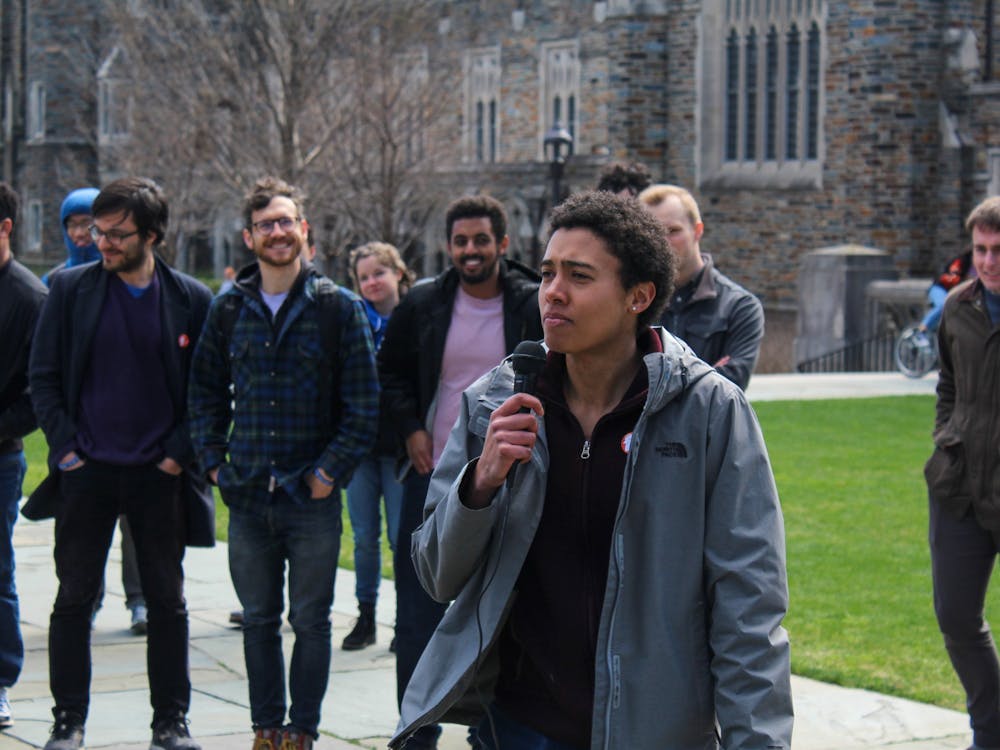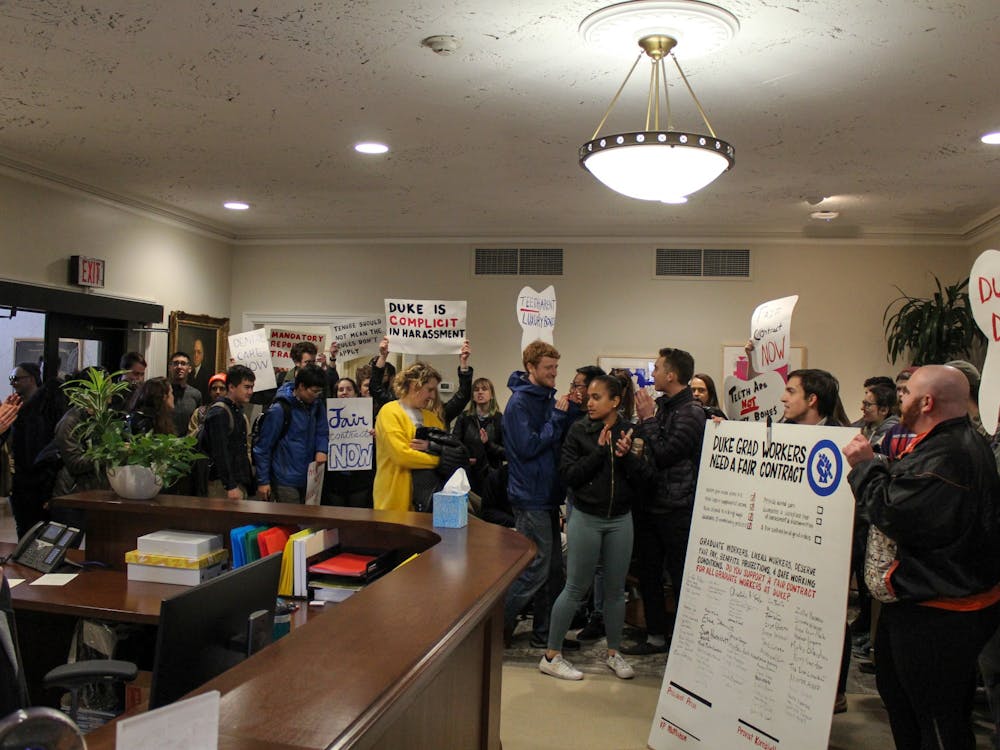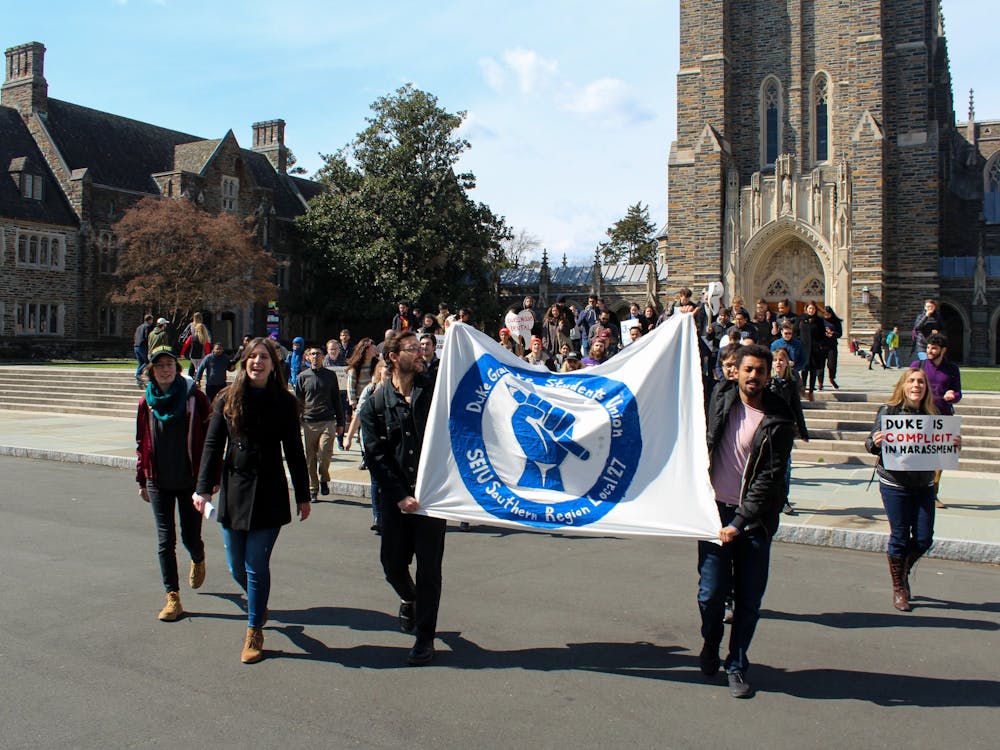“Teeth are not luxury bones!”
Brandishing a microphone, Austin Wadle, second-year engineering doctoral candidate and co-chair of the Duke Graduate Student Union, shouted into it and jabbed it at the ring of sixty people congregated near the Duke Chapel steps.
Protestors from DGSU rallied in front of the Chapel Feb. 28 to demand that Duke’s administration address three concerns: more affordable dental care, greater protection against harassment and discrimination, and a “fair contract” for all graduate workers to ensure greater stability in their relationship with the University.
“We don't want some emails. We don't want some flyers. We want our workers’ rights, and we want them now,” said Renata Kamakura, a first-year doctoral candidate in the Nicholas School of the Environment and a member of DGSU.

The rally began shortly after noon. Some protestors set up a table with a large white cardboard sign stating the terms of their “fair contract,” leaving blank lines at the bottom for the signatures of President Vincent Price and other administrators.
Others chewed Pie Pushers pizza and held up tooth-shaped signs that flapped in the wind, with messages that read “My shiny teeth and me” and “Duke is complicit in harassment.”
Once a group of 50 to 60 protesters had formed, Wadle spoke with pride about how graduate students had pressed the University to raise the graduate stipend in April of last year.
Duke made this change in response to graduate students camping “on these same steps,” making it “our very own Pay-ville,” Wadle said. Behind Wadle, two protesters held a large white flag emblazoned with the symbol of DGSU, a blue fist clenching a pencil.
Wadle then passed the microphone to Michael McGurk, a fifth-year doctoral candidate in the English department and co-secretary of DGSU, who delineated two demands regarding dental care: the University provides the same dental plan to graduate students as it does to other employees and eliminates all premiums and deductibles from the dental plan.
“The problem is [the University] doesn’t see us as employees,” McGurk said, drawing loud “boos” from the crowd.

John Zhu, director of communications for the Graduate School, explained that students have access to “high-quality” dental options.
“In addition to stipends that are competitive among leading universities and six guaranteed years of fully paid health insurance, PhD students have access to affordable, high-quality dental care options that are comparable in cost and benefits to the employee dental insurance plan,” he wrote in an email to The Chronicle.
He also mentioned that students can use the Wellness Center’s dental office or buy an insurance plan at prices comparable to what Duke faculty members pay.
Next, Kamakura discussed the issue of harassment toward graduate students on campus. She emphasized that employees and faculty should undergo mandatory training on discrimination and harassment and how to report it when it occurs.
She also urged the University to expand on the federal definition of harassment and discrimination, design rules to protect the grievant rather than the University and to introduce a neutral, third-party process for reviewing complaints.
“An institution like this is trying to hold itself accountable,” she said. “But it does it to the degree it wants to, in the way it wants to, because no one else is there to do anything else about it.”
Zhu wrote in an email to The Chronicle that the University sought to create a harassment-free environment.
“Duke is also firmly committed to ensuring that all students enjoy a safe learning and training environment free from discrimination and harassment, consistent with regulations from the Department of Education under Title IX,” he wrote.
The last speaker was Chris Shreve, a member of the Duke Faculty Union and instructor of biology.
“Our fight is connected because both of us—our union, your union—we both want Duke to be a better place,” he said. “This is not about tearing anything down. This is about saying, ‘Hey, we're here because we love this place. But we think it can do better. We know it can do better.’”
Then, led by two protesters carrying the flag, the protesters began to march from the Chapel to the Allen Building, chanting “Hey, Hey! Ho, Ho! Workplace harassment’s got to go!” and “Teeth are not luxury bones!”
They streamed into the Allen Building, marched up to the second floor and surrounded the receptionist desk near Price’s office, continuing to chant.

Eventually, Claire Ravenscroft, a sixth-year doctoral candidate in the English department and a member of DGSU, handed Duke employees in the office a paper contract. She also read a letter addressed to Mary Pat McMahon, vice provost/vice president for student affairs; Paula McClain, dean of the Graduate School and vice provost for graduate education; Provost Sally Kornbluth and President Price.
“Now we’re asking you…to hear us when we say we need dental care NOW; that we need real harassment and discrimination protections NOW; and that we need a fair contract guaranteeing these protections and rights NOW,” the letter reads. “Not in a year, not in five years, not when someone else finally decides it is important.”
After Ravenscroft handed over the letter and the contract, the protesters gathered outside the Allen Building for a group photo. They also began singing, “We are the union! The mighty, mighty union!”
Ravenscroft said the protestors’ primary demands—dental care and harassment protections—originated from a university-wide survey that DGSU conducted to gauge graduate students’ concerns. She also emphasized that these are only two issues among a whole slew of problems.
“The only way to actually address all of these issues in a comprehensive way is to have a contract with [the University] which we currently don't have, despite the fact that we are employees,” she said. “This seems like a relatively reasonable ask when you think about it—to have your employer actually give you a contract.”
Jonathan Behrens, a first-year doctoral student in the biology department, said that he joined the rally because of concern over dental care, for which he will not be covered beginning next year. He has also witnessed many students at Duke drop out of their fields due to issues of discrimination or harassment.
“If [the University] doesn’t meet our demands, I will continue to fight for them. It's not a matter of convenience. It's a matter of crisis and definite needs,” he said. “We won't disappear. We'll find other ways to put pressure on the University to make sure that these demands are addressed.”
Nathan Luzum contributed reporting.
Get The Chronicle straight to your inbox
Signup for our weekly newsletter. Cancel at any time.

Chris Kuo is a Trinity senior and a staff reporter for The Chronicle's 118th volume. He was previously enterprise editor for Volume 117.

